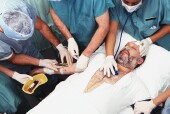- 7 Best Breads for Maintaining Stable Blood Sugar
- Gelatin vs. Collagen: Which is Best for Skin, Nails, and Joints?
- The Long-Term Effects of Daily Turmeric Supplements on Liver Health
- Could Your Grocery Store Meat Be Causing Recurring UTIs?
- Are You Making This Expensive Thermostat Error This Winter?
- Recognizing the Signs of Hypothyroidism
- 10 Strategies to Overcome Insomnia
- Could Artificial Sweeteners Be Aging the Brain Faster?
- Techniques for Soothing Your Nervous System
- Does the Water in Your House Smell Funny? Here’s Why
Revamp Abdominal Aneurysm Screening, Save More Men’s Lives: Study


A change in screening policies could help detect more abdominal aortic aneurysms in older men and save more lives, a new study claims.
Abdominal aortic aneurysm is a potentially deadly bulging of the aorta, the body’s largest blood vessel. The aorta extends from the heart down to the abdomen, supplying blood there and to the rest of the body. Major risk factors for an aortic aneurysm include smoking, high blood pressure, older age and being male.
Currently, men aged 65 and older are screened in the United States and Europe, but the study authors said that a growing number of deaths from abdominal aortic aneurysms occur among people aged 75 and older, and that the number is likely to shift to those over 85 in coming decades.
They also noted that most of the ruptured aortic aneurysms among people between the ages of 65 and 75 occur in male smokers.
Screening male smokers at age 65 and all men at age 75 could prevent nearly four times the number of deaths and reduce the number of scans by 20 percent, according to the study, published Aug. 19 in the Journal of the American Heart Association.
The study team analyzed data from nearly 93,000 people in Britain who were followed for 12 years, to assess them for aortic aneurysm.
Abdominal aortic aneurysms also occur in older women, but previous studies have suggested that screening does not benefit them, the researchers noted. They said women older than 75 who have risk factors such as high blood pressure should be considered for screening if clinical trials confirm a benefit.
“The current screening programs in the United Kingdom, United States and Europe are a major step forward in treating abdominal aortic aneurysm, but these strategies need to be adapted to the changing population that they serve,” study senior researcher Dr. Dominic Howard, a vascular surgeon at the University of Oxford in England, said in a journal news release.
“As people age and smoking rates decrease, strategies will need to be modified to remain effective,” he said.
More information
The American Academy of Family Physicians has more about abdominal aortic aneurysm.
Source: HealthDay
Copyright © 2026 HealthDay. All rights reserved.










